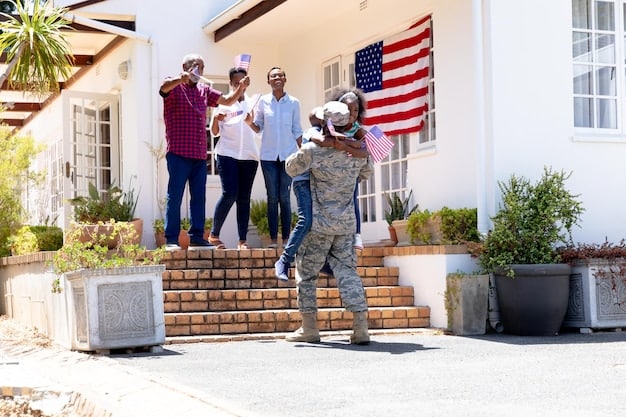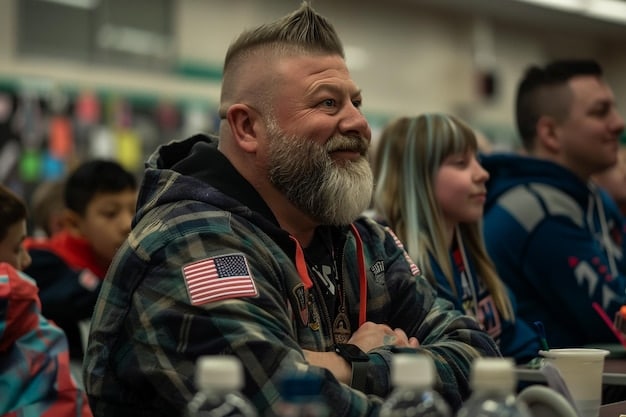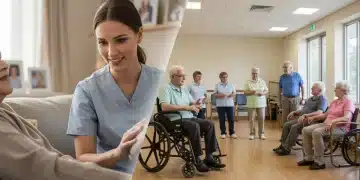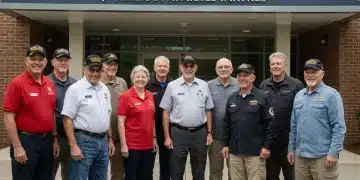Government Assistance for Veterans: Benefits Explained

Government assistance for veterans in the US encompasses a wide range of healthcare, housing, and education benefits designed to support those who have served in the armed forces, ensuring they receive the care and opportunities they deserve.
Navigating life after military service can be challenging, but the US government offers a variety of programs to support veterans. This guide explains the key **government assistance for veterans**, including healthcare, housing, and education benefits, providing a clear path to accessing the support you’ve earned.
Understanding Veterans’ Healthcare Benefits
Access to quality healthcare is a fundamental need, especially for veterans who may have unique health challenges resulting from their service. The Department of Veterans Affairs (VA) provides comprehensive healthcare services to eligible veterans, covering a wide range of medical, surgical, and mental health needs.
Eligibility for VA Healthcare
Determining eligibility for VA healthcare involves several factors, including length of service, disability status, and income level. Understanding these criteria is the first step in accessing the benefits you deserve.
Types of Healthcare Services Offered
The VA offers a wide array of healthcare services, from primary care to specialized treatments. This ensures that veterans can receive comprehensive medical attention tailored to their specific needs.
- Primary Care: Routine check-ups, preventive care, and treatment for common illnesses.
- Specialty Care: Access to specialists in areas such as cardiology, oncology, and neurology.
- Mental Health Services: Counseling, therapy, and treatment for mental health conditions like PTSD and depression.
- Rehabilitation Services: Physical therapy, occupational therapy, and speech therapy to aid in recovery from injuries or illnesses.

The VA’s commitment to providing comprehensive healthcare ensures that veterans can maintain their physical and mental well-being. By understanding the eligibility requirements and the types of services available, veterans can take full advantage of the healthcare benefits they have earned through their service.
Exploring Housing Assistance for Veterans
Secure and stable housing is crucial for veterans transitioning back to civilian life. The government offers various housing assistance programs designed to help veterans find affordable housing, avoid homelessness, and achieve homeownership.
VA Home Loan Guarantee
The VA Home Loan Guarantee program is one of the most popular and beneficial housing programs for veterans, offering significant advantages for those looking to purchase a home.
Homeless Assistance Programs
Unfortunately, some veterans face the challenge of homelessness. The VA and other organizations offer a range of programs to provide temporary housing, job training, and other support services to help homeless veterans get back on their feet.
- Grant and Per Diem (GPD) Program: Provides funding to community-based organizations that offer transitional housing and supportive services to homeless veterans.
- Health Care for Homeless Veterans (HCHV) Program: Offers medical, mental health, and substance abuse services to homeless veterans in community settings.
- HUD-VASH Program: A collaborative effort between the Department of Housing and Urban Development (HUD) and the VA, providing rental assistance vouchers and supportive services to homeless veterans.
These programs are vital in addressing the issue of veteran homelessness and ensuring that those who have served our country have a safe place to call home.
Maximizing Education Benefits for Veterans
Education benefits are a cornerstone of the support provided to veterans, helping them pursue higher education, vocational training, and other educational opportunities. The Post-9/11 GI Bill is the most well-known and comprehensive education benefit available to veterans.

Understanding the Post-9/11 GI Bill
The Post-9/11 GI Bill provides financial assistance for tuition, housing, books, and other educational expenses. Eligibility depends on the length of service and the type of discharge received.
Other Education Programs
In addition to the Post-9/11 GI Bill, several other education programs are available to veterans, each with its own eligibility requirements and benefits. These programs cater to different educational goals and circumstances.
- Montgomery GI Bill (MGIB): Available to service members who contributed to the program during their active duty.
- Vocational Rehabilitation and Employment (VR&E): Helps veterans with service-connected disabilities prepare for, find, and keep suitable employment.
- Survivors’ and Dependents’ Educational Assistance (DEA): Provides educational benefits to eligible dependents of veterans who are deceased or permanently and totally disabled due to a service-connected disability.
Veterans should explore all available education programs to determine which one best suits their needs and goals.
Navigating Disability Compensation for Veterans
Veterans who have suffered injuries or illnesses as a result of their military service may be eligible for disability compensation. This benefit provides monthly payments to veterans with service-connected disabilities.
Eligibility for Disability Compensation
To be eligible for disability compensation, veterans must demonstrate that they have a current disability, that the disability is connected to their military service, and that the disability is rated by the VA.
The Disability Claims Process
Filing a disability claim can be complex, but understanding the process is essential for receiving the compensation you deserve. The process typically involves gathering medical evidence, completing the necessary forms, and submitting the claim to the VA.
Appealing a Denied Claim
If a disability claim is denied, veterans have the right to appeal the decision. The appeals process provides an opportunity to present additional evidence and argue why the claim should be approved.
Navigating the disability claims process can be challenging, but with the right information and support, veterans can successfully obtain the compensation they deserve.
Life Insurance Options for Veterans
Life insurance is an important tool for protecting your family’s financial future. The VA offers several life insurance programs designed to meet the unique needs of veterans.
Servicemembers’ Group Life Insurance (SGLI)
SGLI is a low-cost life insurance program available to active-duty service members, reservists, and members of the National Guard. Coverage can be extended for a limited time after separation from service.
Veterans’ Group Life Insurance (VGLI)
VGLI allows veterans to continue their life insurance coverage after leaving the military. Veterans can convert their SGLI coverage to VGLI within a specified timeframe.
VA Life Insurance for Service-Disabled Veterans
Veterans with service-connected disabilities may be eligible for additional life insurance options through the VA. These programs provide affordable coverage to help protect veterans and their families.
Choosing the right life insurance program is an important step in ensuring the financial security of your loved ones. Veterans should carefully consider their options and select the coverage that best meets their needs.
Additional Resources and Support for Veterans
In addition to the core benefits of healthcare, housing, and education, veterans can access a wide range of additional resources and support services. These resources can help veterans navigate the challenges of transitioning back to civilian life and achieve their personal and professional goals.
Veterans Service Organizations (VSOs)
VSOs are nonprofit organizations that provide assistance to veterans and their families. VSOs can help veterans file claims, access benefits, and connect with other resources.
State and Local Resources
Many states and local communities offer programs and services specifically designed to support veterans. These resources may include job training, financial assistance, and other forms of support.
Mental Health Support
Mental health is a critical aspect of overall well-being. Veterans can access a variety of mental health services through the VA and other organizations. These services can help veterans cope with the challenges of PTSD, depression, and other mental health conditions.
By connecting with these resources, veterans can access the support they need to thrive in their post-military lives.
| Key Benefit | Brief Description |
|---|---|
| ⚕️ Healthcare | Comprehensive medical services provided by the VA, including mental health. |
| 🏠 Housing | VA Home Loan Guarantee and programs to combat homelessness. |
| 🎓 Education | Post-9/11 GI Bill and other educational assistance programs. |
| 💰 Disability | Compensation for service-connected disabilities. |
Frequently Asked Questions
▼
The VA provides comprehensive healthcare services for eligible veterans, including primary care, specialty care, and mental health services, ensuring access to a wide range of medical treatments.
▼
Veterans can access housing assistance through the VA Home Loan Guarantee program, which helps them purchase homes, and through programs aimed at reducing veteran homelessness.
▼
The Post-9/11 GI Bill is the primary education benefit, covering tuition, housing, and books. Other programs like the Montgomery GI Bill also offer educational assistance.
▼
Veterans with service-connected disabilities are eligible for disability compensation, which provides monthly payments based on the severity of the disability and its connection to military service.
▼
Veterans can access life insurance through Servicemembers’ Group Life Insurance (SGLI) while on active duty and Veterans’ Group Life Insurance (VGLI) after leaving the military.
Conclusion
Understanding and accessing the **government assistance for veterans** can significantly improve their quality of life. By exploring the healthcare, housing, education, and other benefits available, veterans can leverage the support they’ve earned to build a successful and fulfilling post-military life.





